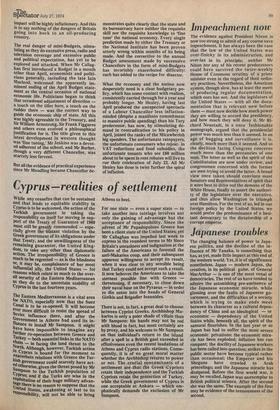Cyprus realities of settlement While any ceasefire that can be
sustained and that leads to equitable stability in Cyprus is to be welcomed, the action of the Turkish government in taking the responsibility on itself for moving in supPort of the Treaty of Guarantee of 1960 must still be greatly commended — especially given the blatant violation by the Greek government of its obligations under that Treaty, and the unwillingness of the remaining guarantor, the United Kingdom, to take any other than diplomatic action. The irresponsibility of Greece is much to be regretted — as is the blindness ?r, it may be, complaisance of her most Influential ally, the United States — for reasons which relate as much to the overall security of the Eastern Mediterranean as they do to the uncertain stability of Cyprus in the last fourteen years.
The Eastern Mediterranean is a vital area for NATO, especially now that the Suez Canal is to be re-opened. It will become ever more difficult to resist the spread of Soviet_ influence there, and after the Government in Athens had used its influence to install Mr Sampson, it might have been impossible to imagine any further co-operation between Greece and Turkey — both essential links in the NATO Chain — in facing the land threat to the North. Although, however, Turkish action in Cyprus is bound for the moment to exacerbate relations with Greece the Turkish government could scarcely have acted otherwise, given the threat posed by Mr _Sampson to the Turkish population of Cyprus; and if the Turks are wise in the exPloitation of their huge military advantage there is no reason to suppose that the United States, awakening at last to its re5ponsibility, will not be able to bring Athens to heel.
For one state — even a super state — to take another into tutelage involves not only the gaining of advantage but the acceptance of responsibility. Since the advent of Mr Papadopulous Greece has been a client state of the United States; yet Mr Callaghan was impelled last week to express in the roundest terms to Mr Sisco Britain's uneasiness and indignation at the failure of the Americans to forestall the anti-Makarios coup, and their subsequent apparent willingness to accept its result, when it was clear to any sensible being that Turkey could not accept such a result. It now behoves the Americans to take the sternest possible line with Greece — threatening, if necessary, to close down their naval base on the Pyraeus — in order to din sense into the heads of General Gizikis and Brigadier Ioannides.
There is not, in fact, a great deal to choose between Cypriot Greeks. Archbishop Makarios is only a paler shade of villain than Mr Sampson: his hands may not be red with blood in fact, but most certainly are by proxy, and his welcome to Mr Sampson on that individual's return to the island after a spell in a British gaol exceeded in effusiveness even the recent laudations of Athens and Cyprus radio stations. Consequently, it is of no great moral matter whether the Archbishop returns to power or not. The crucial concomitants of a settlement are that the Greek Cypriots retain their independence and the Turkish Cypriots retain the protection of Turkey, while the Greek government of Cyprus is one acceptable at Ankara — which emphatically demands the exclusion of Mr Sampson.



























 Previous page
Previous page